
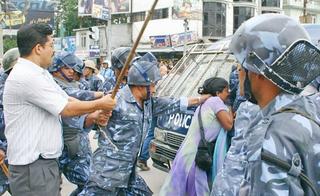






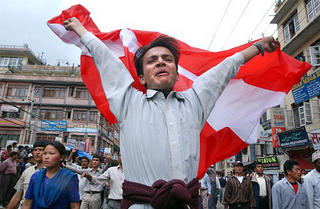




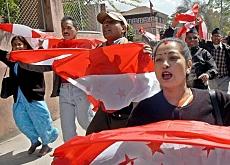





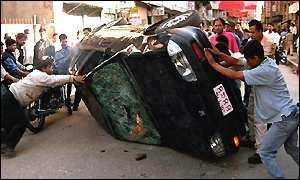
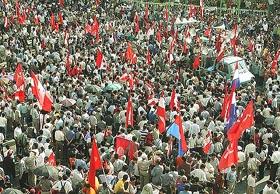
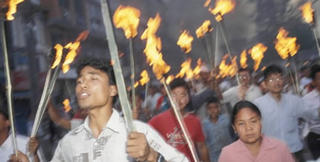
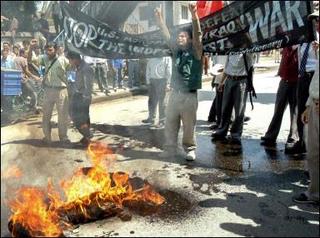

This can be seen as the first stepping stone into the movement. These acts of repression will fuel the movement.
The regime seems to be studying its administrative options should the movement escalate, instead of seeking political reconciliation. The democrats have to be realistic and see this regime for what it is. These are people who stand to be thrown into irrelevance once democracy takes over. And so they will postpone the inevitable the best they can.
A classic tussle between autocracy and democracy is on its way.
In The News
- At least 40 injured after Nepal protest Boston Globe, United States
- Students protest in Nepal, dozens injured
Hindustan Times Police used batons .... About four police were also injured - Students hurt in Nepal street protest Reuters AlertNet, UK police broke up a protest staged to demand the release of student union leaders arrested for opposing a government order to print photographs of the king in text books...... "It was like a battlefield. Some of the students were profusely bleeding after police beat them," Kathmandu taxi driver Bhagawan Chhetri said. "The students then threw stones at cars before being chased away by police." .... Pro-democracy activists and students regularly protest in Nepal
- At least 40 injured after Nepal protest San Jose Mercury News, United States
- At Least 40 Injured After Nepal Protest Guardian Unlimited, UK Police broke up a demonstration Tuesday in Nepal's capital by hundreds of students.... In a separate rally later in the day, about 2,000 political leaders and supporters demonstrated ..... About 500 students blocked a key street Tuesday when police charged at them with batons. The students retaliated by throwing stones....Student groups, political parties and journalists have held a series of protests
- At Least 40 Injured After Nepal Protest Los Angeles Times, CA
- At Least 40 Injured After Nepal Protest Gadsden Times (subscription), AL
- Nepal government gags budget criticism
IANS - Nepal government gags budget criticism:- Webindia123, India
- Nepal: Eighteen detainees released under ICRC auspices ICRC (press release), Switzerland
- Sanjay Upadhya: Nepal - The Realignment Race Scoop.co.nz (press release), New Zealand... Niranjan Thapa, a former interior minister who the parties accuse of trying to suppress pro-democracy protests in 1990. (The top bureaucrat under Thapa then, Dan Bahadur Shahi, was appointed interior minister the day after King Gyanendra took over...... Jagat Gauchan, a former martial arts luminary who went on to spend seven years in prison for his role in the attempted murder of a prominent journalist. Two other appointees have been linked to financial scandals........ Tulsi Giri.... has made clear his personal opposition to multiparty politics........ many of the new ministers were until recently prominent members of the kingdom’s leading parties, the Nepali Congress and the Unified Marxist Leninists (UML)........ Prakash Koirala, the son of Nepal’s first elected prime minister B.P. Koirala ....... Salim Miya Ansari, one of the few Muslim politicians in the world’s only Hindu kingdom, used to be a leading member of the UML...... the prospect of a palace-led realignment of political forces ..... The palace, for its part, must have recognized that bending over backward could not have won over the Nepali Congress and the UML...... October 2002 ..... Unable to recommend a common candidate for the premiership...... What exactly transpired behind the scenes during those few days remains unclear.......... the last legislature – dissolved by Deuba in 2002 exercising his prerogative as an elected premier -- ....... Royal advisers seem to be convinced that the mainstream alliance has shallow roots. For instance, some of the alliance partners have only very reluctantly accepted the demand for the reinstatement of parliament....... Nepali Congress.. has gradually become receptive to the Maoists’ republican agenda ahead of next month’s general convention...... Comprising many western-educated younger Nepalese, the NC(D) ...... whether a true alliance with the Maoists could be envisaged before the rebels lay down their guns........ After 1990, the 400,000 village and district leaders the partyless system cultivated formed the rural and district core of the Nepali Congress and the UML. The pendulum could easily swing the other way........ Considering the flurry of positive statements coming from both sides, a broad working alliance between the mainstream parties and the Maoist rebels could be contemplated. Whether their unity could transcend their deep distrust and suspicions is another matter......... At least 55 of the 74 Nepali Congress members of Nepal’s first elected legislature King Mahendra – father of the present monarch -- dissolved in December 1960 ended up supporting palace-led non-party rule.
- Nepal Maoist rebels hand 18 prisoners to Red Cross Reuters AlertNet, UK The release, which took place in Sindhuli ...... The six soldiers and 12 police, captured in Khotang and Bhojpur districts during clashes on June 19 and 22, were brought to Janakpur
